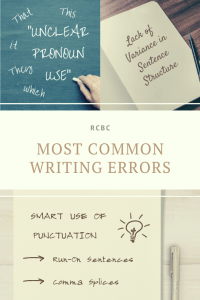By Communication Consultant Carolyn Reagan (Undeclared, ’23)
 When it comes to writing, there are a number of prevalent mistakes that undermine effectiveness, clarity, and cohesiveness. This piece is part of our ongoing series about common writing errors.
When it comes to writing, there are a number of prevalent mistakes that undermine effectiveness, clarity, and cohesiveness. This piece is part of our ongoing series about common writing errors.
A common error in English is to interchange words despite their different definitions, largely because of similar spellings or pronunciations. These words are referred to as homophones. When we write, we need to be cognizant of these words in order to ensure the high degree of quality and comprehension. Small details such as the difference between whether and weather are an important part of strong grammar and syntax. Below, we highlight some frequently mistaken homophones, both from our own experience and from feedback from Professors.
Our first example is perhaps one of the most commonly-mistaken homophone pairs: the difference between affect and effect. Affect is a verb, typically meaning to influence, and effect is a noun, meaning the result of something. For example: “It is important to consider the effect of global warming on everyday life. Massive storms affect our daily lives.” Another example is the difference between further and farther. Farther is related to tangible, literal distances, while further is related to advancing or adding to. For example: “Wegmans is much farther from my house than Walgreens,” and “He is working to further his goal of being a doctor by enrolling in the internship.” Another note: Further can also be used to add an additional thought, similar to the words also or additionally. You may use it to say: “Further, I do not think the company needs to pursue this deal, especially because it will be incredibly costly.”
Two other words with similar spellings that are frequently misused are compliment and complement. A compliment is typically an expression of admiration, while complement describes adding value to something else. Consider: “So many people complimented my cooking today; I definitely think using cumin added a stronger flavor” and “The blue of your sweatshirt really complements your eyes!” Similarly, ensure and insure are not the same word, despite both being verbs. Insure is far more technical, referring to protecting assets. Ensure refers to verifying or safeguarding something. For example, “I use Geico to insure my car,” and “Our diligent work ensured that we will finish the PowerPoint by Friday.” A final example is the difference between perspective and prospective. A perspective is an opinion or attitude, such as thoughts shared during a conversation. For instance, “I would love to hear your perspective on our plans for the new house.” Prospective, on the other hand, is treated as an adjective to describe a person or thing that has the potential to happen. Consider: “She is a prospective Integrated Business and Engineering student at Lehigh.”
The above examples are important words to look out for, but they are by no means an exhaustive representation of common homophones. You can find many guides to commonly confused words online. If you have any other questions relating to homophones or any concern about communication, feel free to send us an email at: inrcbc@lehigh.edu or schedule a quick Zoom consultation with us to discuss more!
Get information and resources about our center at The Philip Rauch Center for Business Communication.

